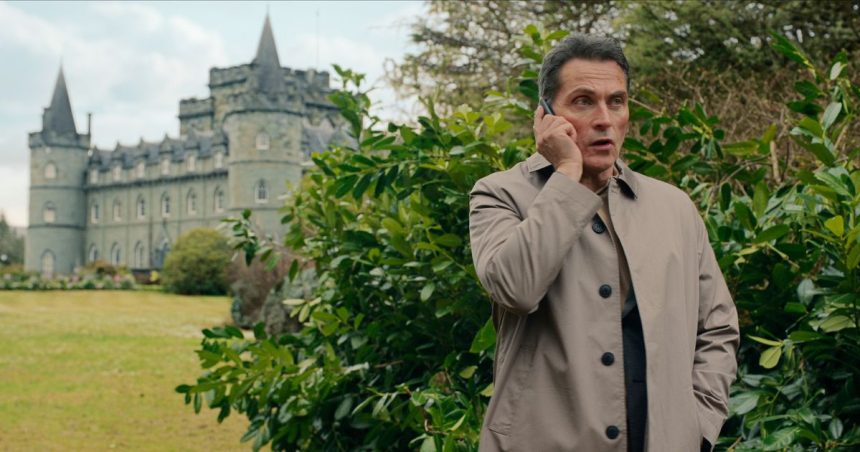Photo: Netflix
Is it possible that after the various physical and behavioral cataclysms of the last few episodes, the work of the American ambassador and her various allies is getting back to normal? Kate and Hal seem to be working pretty well together; Stuart has found the wherewithal to sincerely retract his near sabotage of Kate’s VP prospects; and Kate, Hal, and Eidra develop a less-than-ideal yet quite sophisticated plan for revealing new details of Roylin’s plan to Dennison and Trowbridge, while testing the latter’s response for signs of guilt and getting Roylin off their hands. You know what? Let’s throw in a road trip to the highlands while we’re at it. Rugged scenery, terrifyingly narrow roads, and a buffet of lovely Scottish burrs can be the icing on this episode’s wee tea cake!
Even for a show that’s fundamentally about people talking in rooms, talking as they walk from one room to another, then talking with other people about what they said in prior conversations held in previous rooms, “The Other Army” is notable for how much it draws attention to its conversations in rooms. They feel a bit less rushed and more process-oriented than they have recently, or maybe I’m just noticing it more, particularly as this is an episode where most of the conversations are about planning for another, far more consequential conversation.
In Kate’s reconciliation conversation with Stuart, her office takes on the feel of a sanctuary, which is just right for two people acknowledging that each of them has not been their best self and thinking calmly about their capacity to work well together. Kate is particularly insightful about the challenges of having been in Stuart’s shoes in the past, the awkwardness of being in Hal’s, and dealing with the reality that each role is terrible in its own way. I’m glad Stuart is working his way back toward being in the inner circle and that Kate is sufficiently invested in their relationship, so she carves out this quiet moment for the two of them.
We see something similar at work following Kate’s conversation with the Scottish First Minister, Jemma Doud. She really admired Doud and is bummed that it went sideways at the end, especially as it was an interesting, substantive way to kick off their working relationship. What is she doing in this job, Kate wonders aloud. It sucks to meet a fellow political operative you think could be an ally and friend, only to reveal yourself to them as willing to be a bad guy’s lackey. Can they ever bend the bad guys to their will, or are they “just friends with bad guys”? This isn’t as navel-gaze-y as it might seem; in fact, it’s a reasonable counter-argument to Hal’s passionate assertion last season that in diplomacy, you have to talk to everyone. I like that The Diplomat is questioning and pulling at threads in its own assertions and assumptions, and I’ll take as much of that as it chooses to include.
This episode also makes the most out of the CIA safe house where Margaret Roylin is still … residing? Being kept but not detained? The gray area Eidra is navigating thanks to having taken custody of Roylin after her walk-in is growing darker and larger with every passing hour, so perhaps using Roylin’s bedroom, the house’s living room, and its kitchen is reflective of the situation’s metastasis. Once Kate convinces Eidra to bring Hal into the mix as an intelligence-gathering firewall between them and Roylin, we’re way outside anything resembling safety or a house, so naturally that conversation happens outside at some airstrip.
Once Hal is convinced by Roylin’s version of the story and of her belief that certain details can be set aside for the moment, Roylin shares more of the tale with Kate and Eidra, explaining how the job went so horribly wrong. That seems to boil down to bad timing and sloppiness on Lenkov’s part and naïveté on Roylin and Grove’s part. She takes responsibility for hiring Lenkov, pins the bombing on Stendig, and insists that Trowbridge had nothing to do with any of it. She again claims to be genuinely fearful for Austin’s safety and wants him read in so he stops rattling cages about the situation. It’s clear that whatever details Roylin shared with Hal and isn’t sharing with Kate and Eidra are pretty earthshaking.
Hal, Kate, and Eidra decide their best opportunity to make sure Dennison learns Roylin’s side of the story and to test their hypothesis that Trowbridge was involved will be at the retreat they’re about to attend up in Scotland. Sure, it’ll involve tapping Trowbridge’s phone to monitor his next move for signs of guilt or innocence, but what’s a little highly classified and risky spying between friends?
The final scene’s long-awaited reveal and showdown between Roylin and Trowbridge works because it’s perfectly placed as the fulcrum of the entire season, and because of the narrative and character work in the episode’s earlier scenes between Trowbridge and Kate. It’s impossible to forget what a boor Trowbridge can be, but his ebullience at the Fourth of July party softened him just the tiniest bit in my eyes. Back in Scotland, ensconced in a library with his daily red ministerial despatch box and holding court with Kate and his chief of staff, Trowbridge’s verbal flourishes about things like woolly muffs and three definitions of “dunning” (“relentlessly irritating; chalk on the teeth; when some mechanical device ages and produces a near-inaudible whine”) are colorful and occasionally entertaining, but they also remind us that he’s an incredibly powerful middle-aged man who is happiest when he’s complaining and/or trying to bully others.
Who comforts the grieving parents of fallen sailors and then makes it about himself? Who triumphs over the greatest challenge of his political career and then can’t stop bitching about the cabinet member who just failed to unseat him? Ugh. Now, hold in your mind the possibility that this is also the man who may have had some role in procuring the services of the Lenkov Group, followed by hearing him saying things like, “Someone has to speak to the families — they can’t say ‘Thank you for killing that man,’ I’ve got the fucking UN all over me!” If you need to, take a minute to use the complimentary emesis basin that accompanies this recap.
I like that all of the lead-up to the final scene provides another round of reminders that Kate isn’t just made for running around frantically managing crises and dithering about her relationships with Hal and Dennison. She’s a canny, smooth operator when called upon to be one and turns against Trowbridge’s earlier assessment of her as usefully disarming. This man is such an easy target that all she had to do was call him smart and successful and his entire face lights up with “She likes me!!!” delight.
We see another version of a Pavlovian response to an authoritative woman when faced by Roylin’s quasi-maternal shortness. After he unloads on her about how successful he’s managed to be in her absence, his brain catches up with his mouth, leading him to shut it, and as Roylin had directed seconds earlier, he sits down and takes a sip of water, waiting to hear what she has to say. I’d love to see a close-read piece analyzing Roylin’s many deliveries of her various confessions; a big part of what makes Celia Imrie’s performance such a pleasure to watch is how she calibrates where to emphasize and where to downplay certain elements and the way the writers frame it each time. For Trowbridge, Roylin couches her rationale for arranging the attack in terms of needing a strategy that would neutralize the threat of Scottish secession and “to make a fuss and give you a reason to lead.” Who knows what Roylin expected her mentee’s response to be, but I imagine that him entering a blind rage and leaping forward to attempt to choke her to death while screaming, “You’re a fucking monster,” was not on her bingo card for the evening. On the plus side, his horror is proof positive that Nicol Trowbridge is capable of proper human feeling. Trying to kill Roylin is unambiguously bad; furnishing Dennison with an unimpeachable reason to dash into the room and wrestle Trowbridge to the wall is good; Roylin taking a nasty, quite bloody crack to the back of the skull makes for one hell of a tantalizing cliffhanger.
• Stuart gets the funniest lines in the episode, a helpful reminder that, for my money, The Diplomat works best when it’s got some lift from little day-to-day moments of silliness. It wouldn’t have suited the last few episodes to have leaned into his line about looking down on Eidra “from a great height, as is my right as a gentleman scorned”, but here, it’s a signal that Stuart isn’t self-deluded when he tells Billie, Kate, and Eidra that he’s in the right frame of mind to be back at work.
• The second-funniest moment is between Hal and Dennison in their back-and-forth about Dennison joining the Wylers and the PM in Scotland. Hal puts an end to Dennison’s persistent refusals by reminding him that he knows, and Dennison knows, and Hal knows that Dennison knows that “on the day I got blown up here in your vaunted city, you were planning to fuck my wife.” Dennison’s “See you in Scotland” is perfect, 18/10, no notes.
• Is there a certain amount of “What the fuck is wrong with you?”-ness that everyone working in the embassy needs to exhibit at one point or another? It seems so, and this episode it’s Eidra’s turn to handle that particular hot potato. Honey-trapping Stuart to get to the bottom of Billie’s worry about him after he tried to torpedo Kate’s chances as VP? What?! Eidra’s eventual apology is an unusually rickety and inelegant stop-and-start moment for her, but she seems sincere.











